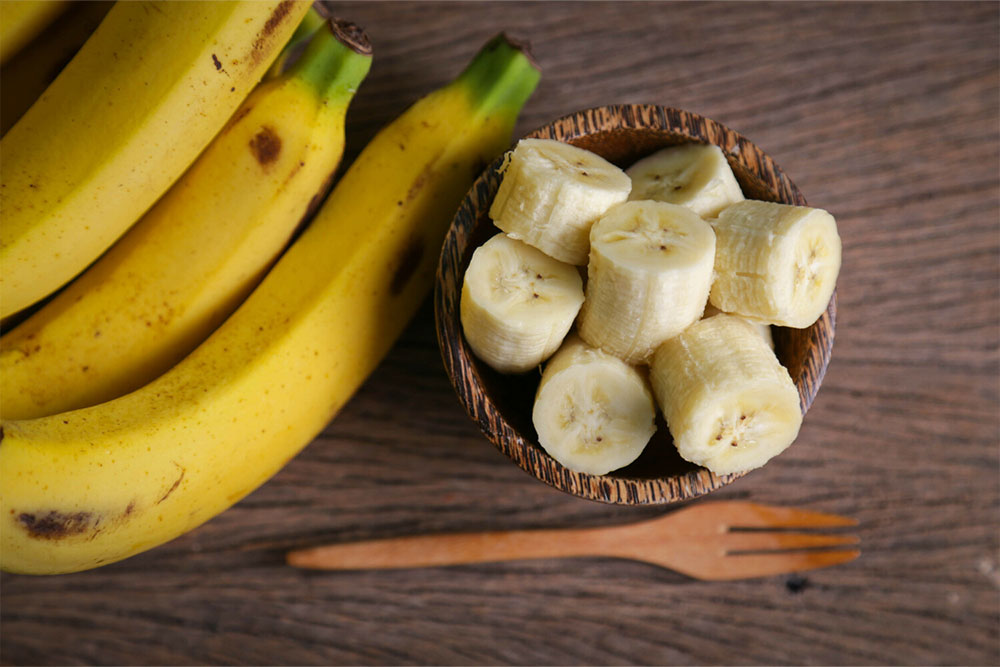
16 foods to manage ulcerative colitis symptoms
Ulcerative colitis is a chronic condition that causes the colon (large intestine) to get inflamed. Consequently, it is also called an inflammatory bowel disease (IBD). Besides inflammation, the disorder can lead to sores in the innermost lining of the colon and rectum. Common symptoms include diarrhea, rectal bleeding, abdominal cramping, rectal pain, and fatigue. Healthy nutrition is vital to cope with this condition. Here are 16 foods that may help manage ulcerative colitis flares.
Ripe bananas
Soft, ripe bananas may be tolerated well during ulcerative colitis flares. They are also a great source of carbohydrates, providing much-needed energy.
Canned fruits
Soft fruits like canned pears or peaches (without added sugars) may be easy to digest during a flare.
White rice
People who cannot handle other foods during a flare-up can consider plain, cooked white rice. One may add turmeric for flavor. Turmeric’s main active ingredient, curcumin, may help relieve ulcerative colitis symptoms.
Oatmeal
Finely ground, low-fiber oats are a nutritious breakfast option for patients with this disorder. However, one must pick varieties low in sugar as the body may not tolerate sweetened oatmeal.
White bread
White bread is a low-residue food; it does not leave behind a lot of waste that must pass through the colon. Other processed grain products, like white pasta, semolina, buckwheat, and sago, may also be tolerated.
Applesauce
Applesauce is soft and easily digestible, making it a great choice during a flare. However, patients must pick an unsweetened variant, as added sugar may worsen inflammation. Alternatively, one can make applesauce at home by cooking and pureeing peeled, sliced apples.
Skinless poultry
Proteins are vital for tissue repair. Skinless chicken and turkey cuts are rich protein sources that most people with ulcerative colitis may tolerate. Patients can also opt for other low-fat meats that are lean and easy to digest. It is advisable to avoid pork, duck, goose, and processed meat like salami, sausages, and meat pies.
Eggs
Eggs are versatile and easy to cook. More importantly, they are a great source of proteins and fats. One can try recipes like omelets and poached, boiled, or scrambled eggs. However, individuals must avoid fried or Scotch eggs as they may worsen the symptoms.
Fish
Fish, such as salmon, tuna, and shrimp, are a great addition to one’s nutrition plan during a flare. They are excellent sources of protein and omega-3 fatty acids. It is recommended to bake, broil, or sauté fish, as frying may cause them to lose their nutritional value.
Tofu
Tofu and tempeh are great options for those who prefer plant-based protein. However, patients must choose the “silken” version, as it is easier to digest and can be cooked in several ways.
Cucumber
Cucumber is a healthy vegetable for ulcerative colitis patients. However, it must be cooked before eating. Raw vegetables are rich in fiber, which can be hard to tolerate. Cooked veggies, however, are a good source of essential nutrients and are gentler on the digestive tract. Cucumbers must also be peeled and deseeded to reduce fiber content further.
Squash
Roasted and steamed butternut or acorn squash are other healthy veggies for those with inflammatory conditions like ulcerative colitis. These are packed with nutrients and are generally tolerated well during a flare.
Carrots
Peeled and cooked carrots are a rich source of vitamins A and K. They are also low in fiber, making them easy to tolerate during a flare.
Nut butter
Nut butter, like peanut, cashew, and almond butter, is packed with protein and healthy fats. It is best to opt for smooth butter over chunkier varieties that could worsen inflammation during a flare.
Bone broth
Bone broth is made by simmering the connective tissue and bones of animals. It can be nutritious for those with ulcerative colitis as it is a rich source of vitamins and minerals. It may also help fight inflammation and soothe the digestive tract. Homemade broth can be used as stock when preparing other meals.
Yogurt
Yogurt can be an excellent source of protein for those who are not lactose intolerant. Yogurt also has live and active bacterial cultures and probiotics that can help relieve the digestive system, providing comfort during a flare. It is recommended to opt for unsweetened yogurt to avoid symptom aggravation. Those lactose intolerant can opt for alternatives like dairy-free yogurt made from coconut or soy. Here, too, individuals must pick options with probiotics and no added sugar.
Many people with ulcerative colitis are at a higher risk of malnutrition. Therefore, experts recommend adding nutrient-dense foods to the meal plan. It is an excellent way of ensuring fullness and preventing nutrient deficiencies. At the same time, it is advisable to opt for low-fiber foods that do not irritate the colon’s inner lining. These foods can help reduce the quantity and frequency of stools. On the other hand, high-fiber foods like multigrain bread and corn may exacerbate the symptoms, affecting one’s quality of life.
Dairy products and ulcerative colitis
Many people with this condition are also lactose intolerant. This can make dairy products an irritant, especially during a flare. In such cases, switching to lactose-free milk, such as soy, rice, or oat milk, is advisable. However, the milk must be fortified with calcium since this is an essential nutrient for the body. Hard cheese may also be suitable. Regular soft cheeses may be challenging to digest, but hard cheeses like cheddar or Swiss may be easier to tolerate due to their low lactose content.
The importance of hydration for ulcerative colitis
Symptoms like diarrhea may leave one dehydrated, worsening abdominal pain and cramps. Hence, patients must drink sufficient water. Sports drinks mixed in equal parts of water help replenish electrolytes and fluids in the body. No-pulp fruit juice may also have the same effect.
Every individual with ulcerative colitis is bound to have unique needs. Thus, there is no one-size-fits-all approach when formulating a nutrition plan. One can speak to a gastroenterologist and create a personalized meal plan.





